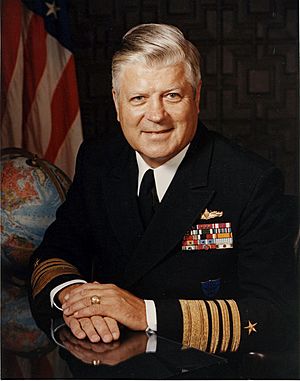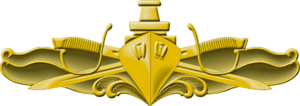Harry D. Train II facts for kids
Quick facts for kids
Harry D. Train II
|
|
|---|---|

Official portrait of Admiral Harry D. Train II, August 1982
|
|
| Born | November 5, 1927 Washington, D.C. |
| Allegiance | United States |
| Service/ |
United States Navy |
| Years of service | 1949–1982 |
| Rank | Admiral |
| Commands held | Supreme Allied Commander Atlantic United States Atlantic Command United States Atlantic Fleet United States Sixth Fleet Carrier Strike Group 6 Cruiser-Destroyer Flotilla 8 USS Conyngham (DDG-17) USS Barbel (SS-580) |
| Battles/wars | World War II Korean War |
| Awards | Defense Distinguished Service Medal Navy Distinguished Service Medal (4) Legion of Merit (4) |
| Relations | Rear Admiral Harold C. Train (father) Rear Admiral Elizabeth L. Train (daughter) |
Harry Depue Train II (born November 5, 1927) is a retired United States Navy admiral. An admiral is a very high-ranking officer in the navy. After his military career, he became a Senior Fellow at the Joint Advanced Warfighting School in Norfolk, Virginia.
Contents
Harry Train began his journey in the Navy in 1945. He was accepted into the United States Naval Academy, which is a special college for people who want to become officers in the Navy. He finished his studies and graduated in 1949.
Ships and Fleets He Commanded
During his time in the Navy, Admiral Train led many important ships and groups. He commanded:
- The attack submarine USS Barbel (SS-580)
- The guided missile destroyer USS Conyngham (DDG-17)
- Cruiser-Destroyer Flotilla 8, which is a group of warships
- The John F. Kennedy Battle Group, a large group of ships led by an aircraft carrier
- From 1976 to 1978, he was in charge of the United States Sixth Fleet in the Mediterranean Sea. This fleet helps keep peace and safety in that important region.
Admiral Train also held several key positions behind the scenes. He worked at the Joint Chiefs of Staff, which is a group of top military leaders who advise the President. He was the Director of the Joint Staff and also served as an assistant to the Chairman of the Joint Chiefs of Staff. He also helped the Chief of Naval Operations, who is the highest-ranking officer in the Navy.
Leading Major Commands
From 1978 to 1982, Admiral Train had some of the most important jobs in the Navy. He was the North Atlantic Treaty Organization's (NATO) Supreme Allied Commander Atlantic. This means he was the top commander for all NATO forces in the Atlantic Ocean. At the same time, he was also the Commander-in-Chief of the United States Atlantic Command and the United States Atlantic Fleet. These roles meant he was responsible for all U.S. Navy operations in the Atlantic. He retired from the Navy in 1982 after a long and successful career.
Family and Education
Harry Train's father, Harold Cecil Train, was also a Rear Admiral in the Navy. Harry Train graduated from Georgetown Preparatory School in 1945 before attending the Naval Academy. He and his wife, Catharine, have four daughters. One of their daughters, Elizabeth L. Train, also became a Rear Admiral, following in her father's and grandfather's footsteps.
Writing and Civilian Work
After retiring from the Navy, Admiral Train wrote a book about his experiences called Reminiscences of Rear Admiral Harry D. Train II, U.S. Navy. He also worked for a large research and engineering company called Science Applications International Corporation (SAIC). He retired from SAIC in 2006.
Community Involvement
Admiral Train has been involved in many important groups. He served as a commissioner on the U.S. Commission on National Security/21st Century, which looked at how to keep the country safe in the future. He was also a member of the Board of Trustees for the Old Dominion University Research Foundation. For a long time, he was the president of Future of Hampton Roads, a group of community leaders who work together to solve problems in the Hampton Roads area of Virginia.
Awards and Honors
Admiral Train received many awards for his service in the Navy. These awards show his bravery and leadership.
Some of his most important awards include:
- Defense Distinguished Service Medal
- Navy Distinguished Service Medal (four times)
- Legion of Merit (four times)
See also
- List of United States Navy four-star admirals
| Military offices
|
||
|---|---|---|
| Preceded by Isaac C. Kidd Jr. |
Commander-in-Chief, United States Atlantic Fleet September 30, 1978 - September 30, 1982 |
Succeeded by Wesley L. McDonald |
| Preceded by Frederick C. Turner |
Commander-in-Chief, United States Sixth Fleet August 1976 – September 1978 |
Succeeded by James D. Watkins |


